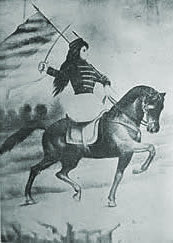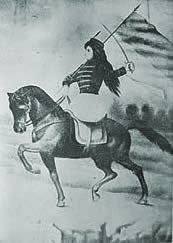
|
Women and Independence in Latin America An exploration of women's involvement in the Latin American Wars of Independence |

|

|
Women and Independence in Latin America An exploration of women's involvement in the Latin American Wars of Independence |

|
Click on the image below to see the full-size image
 Felipe Pardo |
Gender:Male
Ethnic origen: White
Events:
| 1806 | - | Lima | - | Not applicable | - | He was born in Lima on 11 June 1806. |
| 1821 | - | Spain | - | Unknown | - | He emigrated to Spain with his family in 1821. |
| 1822? | - | Lima | - | Unknown | - | He attended Manuela Rávago's tertulias in Lima around this time. |
| 1828 | - | Lima | - | Unknown | - | He returned to Peru, and joined the conservatives. |
| 1829 | - | Lima | - | Unknown | - | His Frutos de la educación was published. |
| 1835-1840 | - | Chile | - | Unknown | - | He was a diplomat in Chile from 1835-40. |
| 1868 | - | Lima | - | Unknown | - | He died in Lima on 25 December 1868. |
Connections:
Anti-indigenous/ anti-blackBiography:
Born in Lima on 11 June 1806, a writer, poet, playwright. His father, Manuel Pardo y Ribadeneyra, was the Oidor of the Audiencia of Cuzco from 1806-1814. During the Pumacahua Revolt 1814, Pardo’s father was imprisoned and sentenced to death. He was saved from the scaffold by a last minute intervention from the Bishop. This had a profound affect on Felipe, who was then aged 15. (Romero de Valle, 239)
The family emigrated to Spain in 1821 where Felipe studied under the Jesuits for 7 years. He returned to Peru in 1828 and wrote caustically about the new social order. (Flores, 89-91)
He was a member of El Ateneo de Perú. (Romero de Valle, 34.)
He was a diplomat in Chile (1835). He was exiled for political matters and returned to Peru in 1840. He contributed to El Nuevo Mercurio Peruano (this ran from 1827-34) and edited El Intérprete, Valparaiso (no dates). He published El espejo de mi tierra periódico de costumbres (1840) the first Peruvian satirical magazine. Held a polemic with José Joaquín Larriva in which they mutually criticised each other sharply.
His many works include: Fruta de la educación (1830 & 1954); La jeta: Medicaciones poéticas por Monsieur Alphonse Chunga, bachiller en sagrados cánones en la Universidad de Chuquisaca y membre de l’Institut de Paris (satirical letters against Santa Cruz, 1835 and 1839).
He wrote in defence of Gamarra in La Prensa Peruana, La Miscelánia and El Conciliador. He was secretary to Manuel Ferreyros in his Bolivian mission in 1830 and 31. (Basadre, 152-160) He believed that Gamarra's authoritarian conservativism was the only way of saving Peru and, like Gamarra, felt that a ruling aristocracy was necessary to achieve this. (Méndez, 33)
He returned to Peru in 1827, joining a conservative group who lacked faith in the unease planted by emancipation among the autocratism of the “Bolivianos” and the unease of the liberals who wrote the 1828 constitution. He held polemics with Larriva in El Investigador, El Télegrafo and El Fusilico. (Tamayo Vargas, 531-540)
Méndez describes him as a racist (anti-indigenous). She provides extracts from his poems of the lñate 1820s-1830s to prove her point. (Méndez, 16, 30-33)
His son, Manuel Pardo Lavalle, was President of Peru in 1875.
His Frutos de educación, a three act play, ridicules a father who tries to force his daughter into marriage and a woman whose lover leaves her because she dances too wildly. In 1836 he was a leading figure in Santiago intellectual life, as Peruvian minister to Chile. He published a journal, El Intérprete. When he returned to Peru he wrote in favour of the conservative party. (Coester, 244-246)
He attended Manuela Rávago's tertulias in Lima. (García y García, 324)
He became blind and suffered paralysis and died in Lima on 25 December 1868.
References:
Urbano, Enrique (editor). (1992) Tradición y modernidad en los Andes
Anderson Imbert, Enrique (1954) Historia de la literatura hispanoamericana, Tomo I, La Colonia cien años de República
Basadre, Jorge (1981) Peruanos del siglo XIX
Coester, Alfred (1919) The Literary History of Spanish America
Flores, Angel (1966) The Literature of Spanish America
Franco, Jean R.O. Jones (editor). (1973) Spanish American Literature Since Independence
García y García, Elvira (1924) La mujer peruana a través de los siglos
Romero de Valle, Emilia (1966) Diccionario manual de literatura peruana y materias afines
Tamayo Vargas, Agusto Literatura peruana